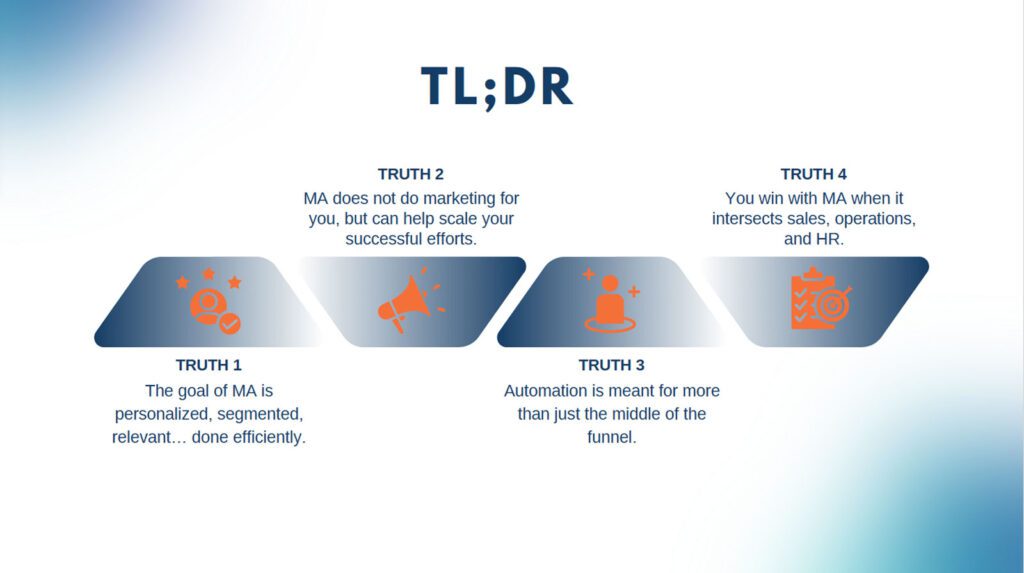When it’s time to scale your business, you’ll often go in search of a tool or resource to help you grow. The term “automation” or “automated” will likely grab your attention in your search. These words have essentially become buzzwords in our fast-paced, done-for-me digital age, but it's important to understand what exactly is being automated.
Your choices for marketing automation platforms seem endless. New players are entering the field all the time, and they all seem to offer different strengths or appeal to different industries. Before setting out on your search, we want to offer some guidance in this two-part blog series on choosing and selecting a marketing automation tool.
Marketing automation means different things to different people. If I surveyed everyone reading this post and asked them to define marketing automation in a sentence or two, I bet I’d get 100 different takes.
At its core, marketing automation is any platform designed to help marketers capture new customers, improve marketing efficiency, and analyze lead behavior and campaign performance. Marketing automation software captures leads, facilitates lead generation, develops relationships with individuals and groups of customers, and moves prospects through the buyer’s journey.
Marketing automation will also combine features like email marketing, social media marketing, search engine marketing, multi-channel marketing, web analytics, and reporting tools.

Marketing automation software is often compared to customer relationship management (CRM) software as they have overlapping functionality. But CRMs currently function as the go-to platform for sales departments, whereas MA platforms are built to scale and accelerate marketing efforts.
The website martechmap.com offers a visual representation of where “Marketing Automation and Campaign/Lead Management” fall in the greater landscape of MarTech (marketing technology). It’s a flooded marketplace, but worth understanding the difference between each tool and what they can do for you.

Marketing automation software automates marketing actions or tasks, streamlines marketing workflows, and measures the outcomes of marketing campaigns. A good marketing automation tool gives you a central database for all marketing information and interactions. It will help you create segmented, personalized, and timely marketing experiences for customers or prospects. These platforms provide automation features across multiple aspects of marketing including email, social media, lead generation, direct mail, digital advertising, and more.
A key consideration is the ability to gain efficiency while enhancing personalization in your marketing. The goal is not just to get more stuff done. The goal is personalized, segmented, and relevant messaging. Fifteen years ago, we’d say, “People do business with people.” We’d emphasize the importance of personal touches and interactions in our marketing. While that adage is still very true, we must add, “But they’ll tolerate a bit of A.I.!”
Remember, the goal is personalized, segmented, relevant…done efficiently. Know your brand DNA and what you can get away with! Consider how human/personal it has to be.
Ready to get serious about marketing automation? Here’s a bit of an audit you can perform on your own marketing.
These are all good signs that marketing automation could work for your business. The key here is understanding that marketing automation does not do marketing for you, but can help scale your successful efforts.
We often have new clients come to us saying they “need to do marketing.” What do they usually mean when they say that? They are usually saying, “Hey, we heard about this HubSpot tool, or we heard about Marketo or Salesforce or whatever, and we need to get that!” So we ask why, then gently lead them to the realization that the tool won’t create the marketing. That’s what humans are for!
Marketing automation can be labeled as failing when leads are not turning into sales. Often the problem, though, is that there is no top-of-the-funnel fuel to keep the middle-of-the-funnel marketing automation fire going.
Even if your database is currently filled with quality leads, how effective will your marketing automation be when you’ve either converted all those leads into customers or when your database begins decaying by roughly 22.5%/year?
It used to be if you wanted the best product, you’d buy the single use item. The early years of all-in-one printers were sketchy. At the time, everyone needed to print documents, make photocopies, and send fax messages. (I know, what’s a fax? I’m old. Don’t hold it against me.) So the likes of Hewlett Packard and Epson rolled out multifunction devices that inevitably would fail on one front and render the entire device useless.
We’ve come a long way. Just think about it. We all carry supercomputers in our pockets that are capable of performing complex calculations, searching the entirety of the world wide web, taking high-end photos, and even shooting cinematic video. We call them phones but they are so much more!
The same is true of marketing automation platforms today.
Dedicated, best-in-class marketing tools have, for the most part, become part of the “all-in-one” technology solution.
“In some ways, the discrete category of marketing automation is fading away a bit. IBM, Oracle, Salesforce.com, Adobe and Teradata have all been involved in mopping up best-of-breed marketing automation companies of various types and so you’re left with a consolidation. The big vendors are pushing marketing automation into part of a bigger, total enterprise stack, associated with digital.”
– Gerry Brown, senior digital marketing analyst at Ovum
It may feel like the right move to find a dedicated marketing automation platform. Something smaller that gives you just what you need without the extras. Maybe cost is the driver and you want to avoid the cost that comes along with the larger software stacks.
This can be a wise move, but you should proceed with caution. A number of years ago, we embraced SharpSpring at The Marketing Squad as an alternative to consider. They were a new and nimble company with a dedicated offering. We saw them as a viable option for those feeling left behind by HubSpot who was actively acquiring, growing, and adding functionality.
What happened? They were bought out! Then we were left shuffling our clients to other viable platforms.
While the first iPhones were really great at taking photos and early all-in-one marketing tools were clunky at best, now smartphones have cameras rivaling DSLR quality and multi-use marketing tools are becoming more seamless to navigate and utilize. In fact, many of the best automation tools today are found in larger packages. The benefit is you don’t have to bolt on multiple different softwares and cross your fingers hoping they will work when needed.
However, my caution is that acquiring the right marketing automation tool is not a decision made in a vacuum. You’ll likely be purchasing a larger package that will impact sales (for sure) and customer service (likely) and HR (likely). You’ll want to consult with all the departments impacted to ensure you’re picking the right tool for your organization as a whole.
Below are some key features that you’ll be looking for as you find the right marketing automation tool for you.
Features to consider in your search
Often, marketers and sales teams find themselves in a tug-o-war at this stage. The marketer is thinking about email automation primarily – building, sending, deliverability, and automation buildout – while the sales team is thinking about lead gen and lead management – lead database, data quality, segmentation, lead scoring, behavior and tracking, CRM integration, automated alerts, tasking, etc.
The good news is you can find platforms that score well in both camps. Websites like G2 offer tools to help you visualize your options and narrow down your selection.
At The Marketing Squad, we recently introduced our own sales and marketing engine for businesses looking to transition from a platform they’ve outgrown or one whose features and/or pricing have left them behind. It’s called Spark, and it’s designed to be adaptable to your business’s unique needs. If you’d like to learn more about Spark or schedule a demo, visit this page.
Our next blog will discuss how you can leverage your selected marketing automation tool to gain the efficiency you desire and fuel the growth your business needs.

Copyright 2025 The Marketing Squad | Privacy Policy | Disclaimer | Terms of Service